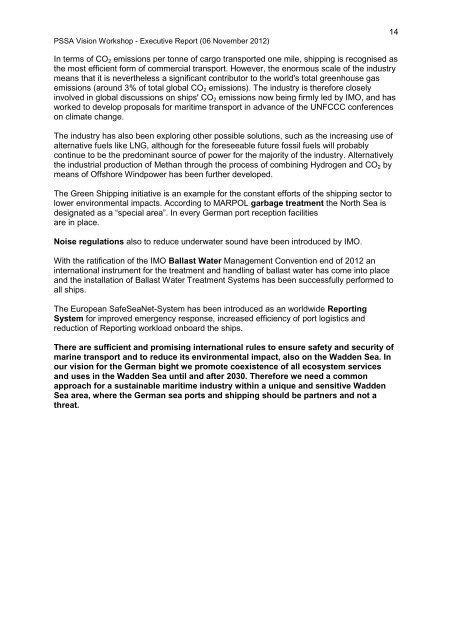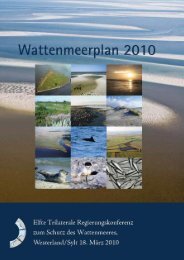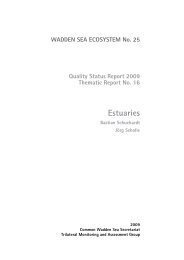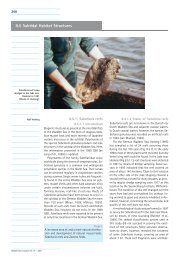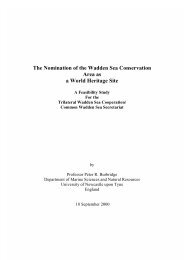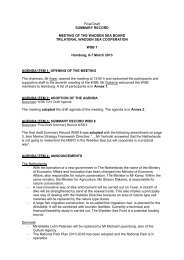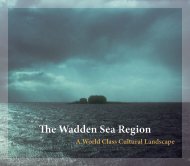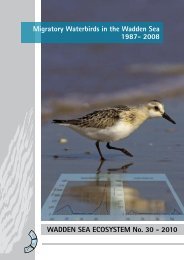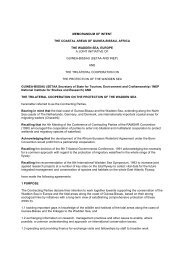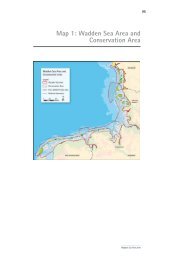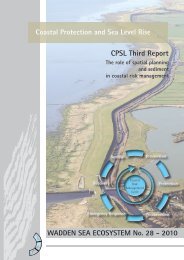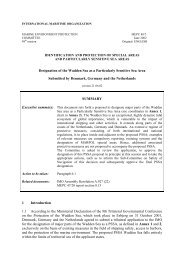PSSA Workshop Report 2012 - Trilateral Wadden Sea Cooperation
PSSA Workshop Report 2012 - Trilateral Wadden Sea Cooperation
PSSA Workshop Report 2012 - Trilateral Wadden Sea Cooperation
You also want an ePaper? Increase the reach of your titles
YUMPU automatically turns print PDFs into web optimized ePapers that Google loves.
<strong>PSSA</strong> Vision <strong>Workshop</strong> - Executive <strong>Report</strong> (06 November <strong>2012</strong>)<br />
14<br />
In terms of CO 2 emissions per tonne of cargo transported one mile, shipping is recognised as<br />
the most efficient form of commercial transport. However, the enormous scale of the industry<br />
means that it is nevertheless a significant contributor to the world's total greenhouse gas<br />
emissions (around 3% of total global CO 2 emissions). The industry is therefore closely<br />
involved in global discussions on ships' CO 2 emissions now being firmly led by IMO, and has<br />
worked to develop proposals for maritime transport in advance of the UNFCCC conferences<br />
on climate change.<br />
The industry has also been exploring other possible solutions, such as the increasing use of<br />
alternative fuels like LNG, although for the foreseeable future fossil fuels will probably<br />
continue to be the predominant source of power for the majority of the industry. Alternatively<br />
the industrial production of Methan through the process of combining Hydrogen and CO 2 by<br />
means of Offshore Windpower has been further developed.<br />
The Green Shipping initiative is an example for the constant efforts of the shipping sector to<br />
lower environmental impacts. According to MARPOL garbage treatment the North <strong>Sea</strong> is<br />
designated as a “special area”. In every German port reception facilities<br />
are in place.<br />
Noise regulations also to reduce underwater sound have been introduced by IMO.<br />
With the ratification of the IMO Ballast Water Management Convention end of <strong>2012</strong> an<br />
international instrument for the treatment and handling of ballast water has come into place<br />
and the installation of Ballast Water Treatment Systems has been successfully performed to<br />
all ships.<br />
The European Safe<strong>Sea</strong>Net-System has been introduced as an worldwide <strong>Report</strong>ing<br />
System for improved emergency response, increased efficiency of port logistics and<br />
reduction of <strong>Report</strong>ing workload onboard the ships.<br />
There are sufficient and promising international rules to ensure safety and security of<br />
marine transport and to reduce its environmental impact, also on the <strong>Wadden</strong> <strong>Sea</strong>. In<br />
our vision for the German bight we promote coexistence of all ecosystem services<br />
and uses in the <strong>Wadden</strong> <strong>Sea</strong> until and after 2030. Therefore we need a common<br />
approach for a sustainable maritime industry within a unique and sensitive <strong>Wadden</strong><br />
<strong>Sea</strong> area, where the German sea ports and shipping should be partners and not a<br />
threat.


